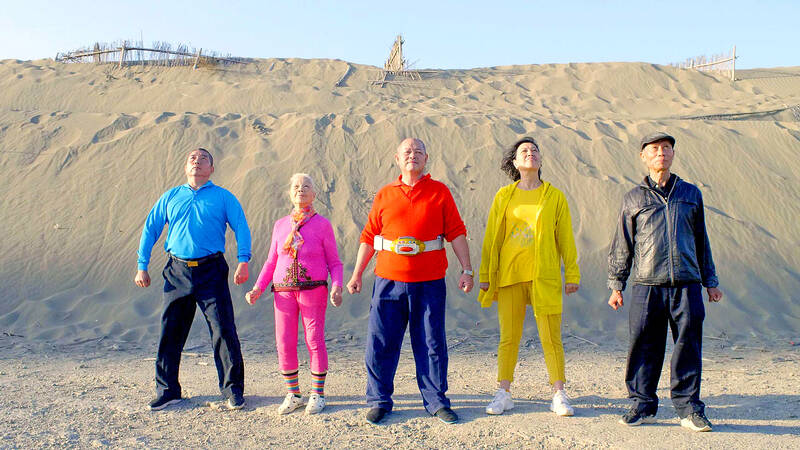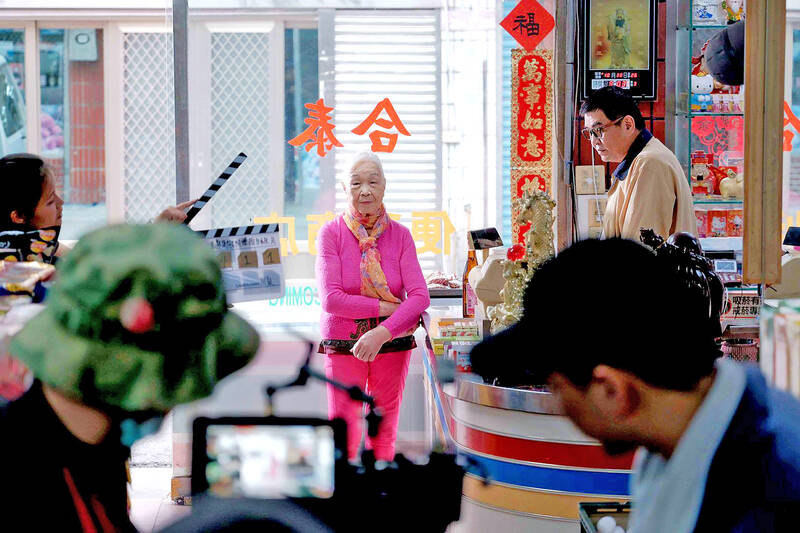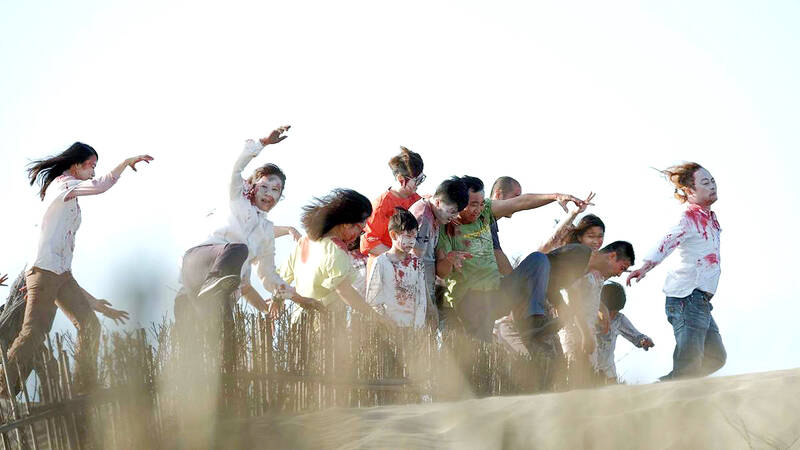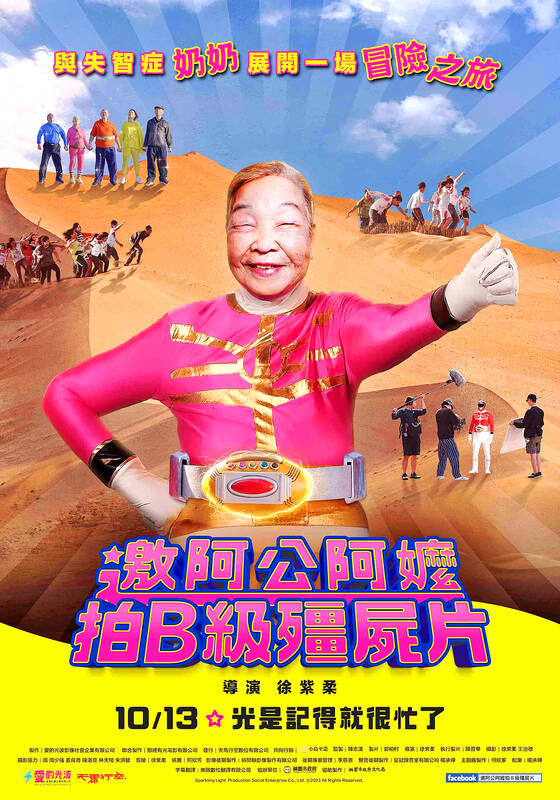“Don’t take being remembered for granted,” director Hsu Tzu-jou (徐紫柔) narrates in one scene of her documentary, Zombie Film with Grandpas and Grandmas (邀阿公阿嬤拍B級殭屍片). The wacky title and hilarious antics of the mostly elderly actors cannot hide the heartbreaking fact that the star of the show, Hsu’s then 94-year-old (now 96) grandmother, suffers from dementia.
Filmed over the course of four years, the documentary follows Hsu’s efforts to make a B-movie about Power Rangers saving the world from memory-devouring zombies, featuring her family members and other amateur thespians she recruited with great effort from their Taoyuan neighborhood and beyond. Playing the Pink Power Ranger in full costume with gusto, granny Chung Ching-mei (鐘景妹) is a natural showwoman, but she can barely remember one line at a time and often has no idea what she is doing.
Diagnosed with mild dementia 10 years prior to filming, Chung still largely retains her long-term memory but forgets most of the things that happened in the present. But she remains positive and cheerful for the most part, and with timely medical treatment and attentive care by her family, she’s still able to live a happy life. Part of Hsu’s motivation for making the documentary is to promote awareness of dementia, which affects 460,000 people in Taiwan, and show that with early detection and proper management, the condition is manageable.

Photo courtesy of Sky Digital Entertainment
Hsu first began filming amusing skits featuring Chung and other relatives donning various costumes just to keep her grandmother’s mind active. The videos unexpectedly became a social media sensation, leading to many public performance opportunities. But since Chung was unable to remember the lines and actions for an entire show, Hsu decided to feature her in a movie instead, where she could complete one scene at a time. Titled Memory Rangers (記憶戰士), the movie conveys Hsu’s idea that every young person can serve as a “memory warrior” to slow the deterioration of the faltering brains of their elderly loved ones.
What’s surprising is Hsu’s drive to execute this endeavor properly despite little experience and much uncertainty. She holds auditions, hires a film crew with makeup artists and tirelessly tries to get community members involved — one scene shows about 80 extras playing zombies who descend upon scenic sand dunes by the sea. Much of the comedic effect is provided by unintentionally funny and self-deprecating actors recruited from the 800-strong Taoyuan Golden Voice Singing Club (金嗓歌友會), a thriving senior social group boasting many hidden talents itching to strut their stuff.
Hsu successfully takes an otherwise grave and serious topic and puts an overwhelmingly positive spin on it. Aside from her gregarious family members who aren’t shy to poke fun at themselves and act ridiculous, Hsu managed to conscript just the right characters to make the whole thing an extremely entertaining affair. While one does not feel pity for Chung even as she struggles to recite a single sentence — especially since she doesn’t seem to mind herself — her condition still results in many tear-jerking moments.

Photo courtesy of Sky Digital Entertainment
The finished 20-minute movie can be found on the family’s YouTube channel, but the documentary doesn’t mention that — which was one of the main audience criticisms during Tuesday’s test screening. The videos weren’t easy to search for either, accessible in three segments at: www.youtube.com/@user-gw9pt2mn2x.

Photo courtesy of Sky Digital Entertainment

Photo courtesy of Sky Digital Entertainment

The Taipei Times last week reported that the rising share of seniors in the population is reshaping the nation’s housing markets. According to data from the Ministry of the Interior, about 850,000 residences were occupied by elderly people in the first quarter, including 655,000 that housed only one resident. H&B Realty chief researcher Jessica Hsu (徐佳馨), quoted in the article, said that there is rising demand for elderly-friendly housing, including units with elevators, barrier-free layouts and proximity to healthcare services. Hsu and others cited in the article highlighted the changing family residential dynamics, as children no longer live with parents,

It is jarring how differently Taiwan’s politics is portrayed in the international press compared to the local Chinese-language press. Viewed from abroad, Taiwan is seen as a geopolitical hotspot, or “The Most Dangerous Place on Earth,” as the Economist once blazoned across their cover. Meanwhile, tasked with facing down those existential threats, Taiwan’s leaders are dying their hair pink. These include former president Tsai Ing-wen (蔡英文), Vice President Hsiao Bi-khim (蕭美琴) and Kaohsiung Mayor Chen Chi-mai (陳其邁), among others. They are demonstrating what big fans they are of South Korean K-pop sensations Blackpink ahead of their concerts this weekend in Kaohsiung.

Taiwan is one of the world’s greatest per-capita consumers of seafood. Whereas the average human is thought to eat around 20kg of seafood per year, each Taiwanese gets through 27kg to 35kg of ocean delicacies annually, depending on which source you find most credible. Given the ubiquity of dishes like oyster omelet (蚵仔煎) and milkfish soup (虱目魚湯), the higher estimate may well be correct. By global standards, let alone local consumption patterns, I’m not much of a seafood fan. It’s not just a matter of taste, although that’s part of it. What I’ve read about the environmental impact of the

Oct 20 to Oct 26 After a day of fighting, the Japanese Army’s Second Division was resting when a curious delegation of two Scotsmen and 19 Taiwanese approached their camp. It was Oct. 20, 1895, and the troops had reached Taiye Village (太爺庄) in today’s Hunei District (湖內), Kaohsiung, just 10km away from their final target of Tainan. Led by Presbyterian missionaries Thomas Barclay and Duncan Ferguson, the group informed the Japanese that resistance leader Liu Yung-fu (劉永福) had fled to China the previous night, leaving his Black Flag Army fighters behind and the city in chaos. On behalf of the